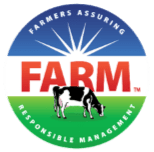 In October 2019, I attended a seminar in Philadelphia, PA, to be trained on all the updates to Version 4.0 of the National Dairy FARM Program. Version 4.0 will be in effect from January 1, 2020, to December 31, 2022. This article will highlight some of the main changes with this new version.
In October 2019, I attended a seminar in Philadelphia, PA, to be trained on all the updates to Version 4.0 of the National Dairy FARM Program. Version 4.0 will be in effect from January 1, 2020, to December 31, 2022. This article will highlight some of the main changes with this new version.
Immediate Action
If a farm is routinely tail docking, this is now considered an immediate action. The farm will have 48 hours to comply with this standard, and once in compliance, they will have follow-up visits after 1 week, 1 month, and 3 months.
Mandatory Corrective Action Plans
Within a Mandatory Corrective Action Plan, standards must be met within 9 months, or less. Here are some examples of MCAPs for Version 4.0:
A written Veterinary Client Patient Relationship (VCPR) and a written herd health plan that are both signed annual by the herd veterinarian
- Pre-weaned calves must be disbudded by 8 weeks of age and have access to water by day 3
- Non-ambulatory animals must be moved using proper methods, provided prompt medical care, have access to feed and water, and protection from heat, cold, and predators
- Acceptable euthanasia practices, including how to identify animals to be euthanized, using AABP or AVMA approved methods, and disposing of the carcass appropriately
- Feed and water access for all animals
- Signed cow care/ethics agreement (annually) for all non-family employees with animal care responsibilities
- Continuing education in animal care and handling for non-family employees with animal care responsibilities, and job-specific training for the following topics if they apply:
- Stockmanship
- Pre-weaned calf care
- Non-ambulatory animals
- Euthanasia
- Determining if animals are fit to transport
- Written protocols for the following:
- Pre-weaned calf care (how they are moved; how they are fed colostrum, milk/milk replacer, feed, and water; and disbudding)
- Non-ambulatory animals (how they are moved; when prompt care is provided; and how they are provided with feed, water, protection from the elements and predators)
- Euthanasia (how to identify animals to be euthanized; euthanasia techniques in accordance with AABP or AVMA guidelines; and appropriate carcass disposal)
- Acceptable fitness to transport
Continuous Improvement Plan
Within a Continuous Improvement Plan, standards must be met within 3 years, or less. Here are some examples of CIPs for Version 4.0:
- Animal observations:
- Body condition score: 99% or more of pre-weaned calves, weaned heifers, and lactating cows score 2 or more on the FARM 5-point scale
- Hock injuries: 95% or more of lactating cows score a 2 or less on the FARM 3-point scale
- Knee injuries: 95% or more of lactating cows score a 2 or less on the FARM 3-point scale
- Locomotion: 95% or more of lactating cows score a 2 or less on the FARM 3-point scale
- Broken tails: 95% or more of lactating cows do not have broken tails
- Providing pain management when disbudding calves (with guidance from the herd veterinarian)
- Permanent and complete drug treatment records
- Signed cow care/ethics agreement (annually) for all family employees with animal care responsibilities
- Continuing education in animal care and handling for family employees with animal care responsibilities, and job-specific training for the following topics if they apply:
- Stockmanship
- Pre-weaned calf care
- Non-ambulatory animals
- Euthanasia
- Determining if animals are fit to transport
Additionally, the number of animals scored at each farm has been revised with Version 4.0. For each of the age classes (pre-weaned heifers, post-weaned heifers, pre-fresh cows and heifers, and lactating cows), if there are <100 animals, all of them will be scored and if there are >100 animals in that age class, 100 will be scored. Locomotion will only be scored in the highest, oldest milking group.
For help understanding these updates, for paperwork review, or a barn walk through, contact Regional Dairy Specialist Lindsay Ferlito (lc636@cornell.edu, 607-592-0290), and visit the FARM program website at https://nationaldairyfarm.com/dairy-farm-standards/animal-care/.
